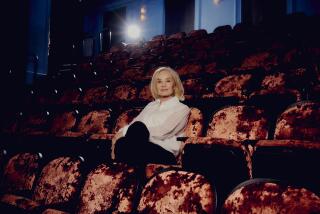THEATER : ‘Sister’ Ahead of Its Time : In the ‘60s, the play just slipped past censors. The comedy about a lesbian soap star could have been written yesterday.
- Share via
NORTH HOLLYWOOD — Some plays are always pertinent. Their messages speak to any generation. British playwright Frank Marcus’ ‘60s comedy “The Killing of Sister George” is one of those plays.
A new London revival of the play has been packing them in since April. And this weekend, Actors Alley is opening its version at its El Portal Storefront Theatre.
The play’s plot could have been created yesterday.
A major, long-running and very popular character in a soap opera, Sister George, a nurse, has been killed off in the story line. The effect on the actress who played the role, June Buckridge, provides the drama and the black high comedy in the piece.
What made “Sister George” a landmark production in the London of 1965 is that Buckridge and her longtime female lover, Childie, are nearing the end of their own relationship. But the word lesbian is never mentioned, which allowed the play to slip past the stringent censorship of the times. Peter Grego, director of the Actors Alley production, says that even if the dialogue had quoted Sappho, the play might have been banned.
Things are different today, but Grego is adamant about the play’s value to current audiences, both because of the relationship question and because of the show-business dichotomy between the real person and the often mythical image by which that person is known.
“Even today,” Grego says, “everybody continues to deal with fiction in their lives. Although, plotwise, the play seems to be about these women and 1965, the theme of how we have reality and illusion going on all at the same time, that really hasn’t changed. In fact, I think the author would probably say it’s maybe even more pertinent today because of how the media interacts in our daily lives.”
In the case of a soap star, or any media icon, Grego says, “the image overwhelms who the person is. When you meet the person, you’re expecting the image.”
The character Buckridge is even called Sister George by her friends. As Buckridge fights the BBC and struggles with her waning relationship, Sister George’s shadow falls heavily across her. It’s an identity crisis today’s audiences will be familiar with.
Actors Alley actress Leslie Simms, who plays Sister George, says, “Sister George has so many things packed up in her. Playing her, the one thing I have found that surprised me is her really great insecurity. She just covers it up, and she won’t take any nonsense, and jumps on you before you have any chance, as a protection. That’s the only way she can get through. If you say anything to her, she’ll fall apart right in front of you. That’s her secret.”
Simms’ initial response to the role was a gasp. “Challenging,” she calls it. “Risky. It’s a big risk, because it’s totally different from anything I usually do. I’m usually that pedantic schoolteacher, or the warm and loving nurse. It’s nice to play a nurse who’s a bitch.”
“The thing I thought was daunting,” Grego says, “was trying to make this real and honest and truthful for today’s audience, but from the perspective of 30 years ago.”
When beginning to plan his production, he briefly considered updating the play. But the playwright’s son, a friend of Grego’s, told him that his father, when asked about updating for the current London production, responded that he had learned over the years that his lesbian characters were not stereotypes, but archetypes, and belonged to the ‘60s.
The play speaks, Simms says, “to relationships, and it doesn’t matter whether you’re male, female or two males or two females. Human beings are human beings. You can be hurt, you can love. One can get out of love, and one can lose.”
Grego says, “Nowhere are we trying to say this is every couple. When the humor comes out of this play, it comes out of the integrity of these very specific characters and their relationship. That still talks to audiences.”
(BEGIN TEXT OF INFOBOX / INFOGRAPHIC)
WHERE AND WHEN
What: “The Killing of Sister George.”
Location: Storefront Theatre, Actors Alley at the El Portal Center, 5269 Lankershim Blvd., North Hollywood.
Hours: 8 p.m. Thursday to Saturday, 2 and 7 p.m. Sunday. Ends Sept. 17.
Price: $15.
Call: (818) 508-4200.
More to Read
The biggest entertainment stories
Get our big stories about Hollywood, film, television, music, arts, culture and more right in your inbox as soon as they publish.
You may occasionally receive promotional content from the Los Angeles Times.










